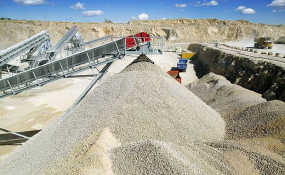By Yohanes Jemaneh
The construction industry is booming in Ethiopia. Years ago, the country had been importing cement at huge costs for its developmental projects. In 2010/11 the country imported 0.3 million tonnes cement by spending millions of USD. However, owing to the growing numbers of cement factories, these days, the country has begun exporting beyond meeting local consumption.
The number of cement and chemical producing industries has been increasing from 18 in 2003 to 66 in 2007 E.C. Specifically in cement, there are 13 factories that are producing over 12 million tonnes of cement per annum.
Industry Survey Supervision and Support Directorate Acting Director Simeneh Gizaw said that currently, the number of operational cement factories are 13; additional 3 cement factories that would commence production this fiscal year are under construction.
He said that the country is working to attain the five-year cement production target, raising the national cement production capacity to 17 million tonnes by 2025. The country is on the right track for producing sufficient cement product to the local demand. Moreover, in 2005 E.C, Ethiopia began exporting cement to neighboring countries and earning foreign currency which is a remarkable stride in the construction sector.
On the other hand, the engagement of foreign investors in the sector has resulted in higher production, income tax, job creation, knowledge transferring and technology advancement. They are also supporting to empower the local cement industries by organizing training programmes.
Besides increasing the production volume, the Ministry of Industry together with stakeholders is working to create conducive environment for the construction sector through supporting and supervising. According to Simeneh, the Ministry is working in the sphere of human resource development together with Adama Science and Technology University.
Currently, the country is constructing different mega projects such as the Grand Ethiopian Renaissance Dam, sugar factories, houses, industrial parks and railway among others. “For all these mega projects cement is one of the most important inputs.”
Mugher Cement Enterprise Director General Fekadu Deme said Mugher was the beginner in cement production and there has been production and quality increment in the sector since its establishment in 1957 E.C. The ensuing industries have also been playing notable role in the national building arena.
Mentioning his Enterprise’s 5000 tonnes of cement per day supply to country’s mega projects, Fekadu noted that the enterprise is working to increase sufficient and efficient product by modernizing system, technology and resources. Provided that other producers walk in similar road they might start exporting beyond supplying the local demand.
Today, the nation is consuming a higher amount of cement for its daily growing construction projects. Locally, the main cement consumers are the government, clients (contractors), development institutions (operators) and private owners. And the cement market is also growing from time to time.
According to Zelalem Hailegiorgis, CSA Business Statistics Directorate Director, in 2007 E.C, the country secured some 8.7 million Birr from cement and related chemicals’ sale, of which 177, 245 Birr is earned from export to Kenya, South Sudan, Somalia and Djibouti. Some 11, 143 jobs have also been created in the manufacture of cement, lime and plaster production within similar period.
However, when the nation stop importing cement and begin earning from export, still there is a question of quality and management. Dr. Engineer Gashaw Washa, Deputy Director of Ethiopian Construction Project Management Institute, believed that besides boosting the product volume, the nation must work to improve the quality of cement. As to him, the current motive in using cement is not efficient.
He said that since the product is among the perishable ones, cement should be used before its service time went out. The transportation and mixing process should also be operated in a full care.
To alleviate all the drawbacks and keep the quality of cement, there should be an organized association that would offer quality transportation service by receiving cement and mixing it with the needed construction chemicals within a proper atmosphere. According to him, the establishment of concrete processing association would help to prevent these problems.
While the current motive to produce cement is very inspiring, there should be proper concern for the quality and management of the product. “Even if the process of cement production in the country is improving due to the dispersion of foreign notable producers, the management is still low. And it should be one of the mechanism to draw a lesson about the management system from these producers. Starting from the packing, all the transportation and mixing process ought to be under a strong care.”









